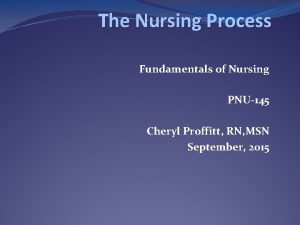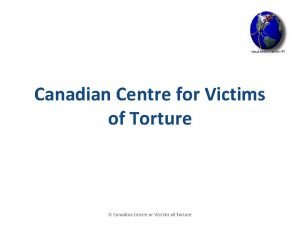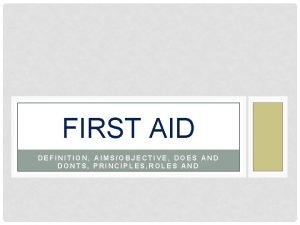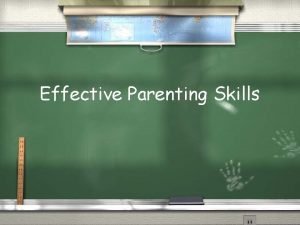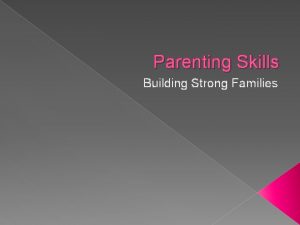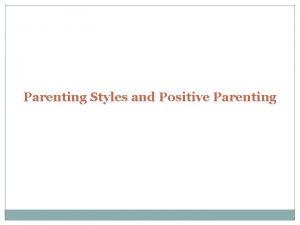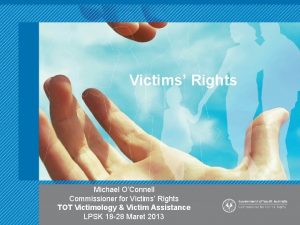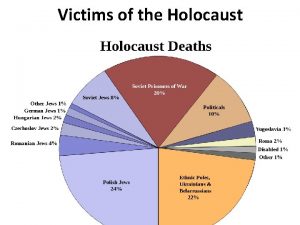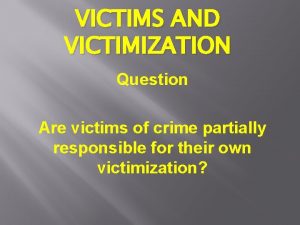Parenting Plans that Prioritize Safety for Victims of



















- Slides: 19

Parenting Plans that Prioritize Safety for Victims of Domestic Violence & Their Children Peter Jaffe & Maureen Reid Part B May 25, 2011 Guelph-Wellington Action Committee on Sexual Assault and Domestic Violence 1

Are DV Homicides Predictable & Preventable? 85% of the cases had at least 7 risk markers Critical information held by family, work colleagues, front-line professionals Children are the victims in a number of ways Critical need to collaborate between child protection and VAW services as well as the justice system (criminal and family court)

Danger Assessment Risk Factors Partner used or threatened with a weapon (20. 2) Partner threatened to kill woman (14. 9) Partner tried to choke/strangle woman (9. 9) Partner violently and constantly jealous (9. 2) Woman forced to have sex when not wanted(7. 6) Gun in the house (6. 1) Partner controls most/all of woman’s activities(5. 1) Drunk every day (or almost) or illicit drugs (4. 1) Campbell (2003)

Can a perpetrator of domestic violence be a good parent?

Why is Domestic Violence Relevant in Custody Disputes? Abuse Does Not End With Separation Overlap Between Child Abuse and Domestic Violence Children’s Exposure to an Inappropriate Role Model Undermining of Non-Abusive Parent New Relationships Potentially Violent Perpetual Litigation as Form of On-Going Control Extreme Cases - Homicides and Abductions Jaffe, P. G. Lemon, N. & Poisson, S. E. (2002) Child Custody Disputes and Domestic Violence: Clinical and Legal Issues. Sage, Thousand Oaks, CA

Video Discussion Questions If you were a judge or custody evaluator what kind of contact would you considering allowing Nick Nolte to have with his daughter for the next 6 months? What community services would you need to implement your plan? What are some of the barriers to providing service to this whole family system?

What Services Will Nick Nolte and his Family Need or Come in Contact With? Justice System: Family Court (Civil)/Criminal Court • Child Protection • Visitation/Access Dispute • Assault Charge (Child Abuse/DV) • Police Intervention • Crown Attorney • Multiple Judges • Victim Witness Program • Probation Officer • Family & Criminal Lawyers/Advocates for mother, father & child • Court Witnesses (Experts, Family, Community Agencies)

What Services Will Nick Nolte and his Family Need or Come in Contact With? Social Services/Health �Child Protection Services �Supervised Visitation Center �Batterer’s Program �Advocates (Victim & Child) �Alcohol/Addiction Counselling �Family Doctor �Children’s Counsellor/Program �Mother’s Counsellor/Program �Court Assessors & Mediators �Community Volunteers (Church, Friends, Relatives)


Limits and Benefits of Risk Assessment Limitations �Retrospective rather than prospective studies �Propensity towards “false positives” �Risk is dynamic rather than static Benefits �Development of common language across systems �Assists in the prioritization of limited resources �Assists with safety planning strategies - may saves lives 10


Dynamics Between Victim & Perpetrator Role model for unhealthy relationships Gender roles Constrained sense of community – limited access to support (problems undermine access to potential resources) Siblings may be protective or abusive Loyalty conflicts (betrayal in disclosure)

Custody Dispute Dilemmas Accurately assessing perpetrator, victim, & children Domestic violence but no visible/measurable impact on children Children aligned with victim/primary caretaker {alienation allegations? } Children aligned with batterer {wishes vs. best interests} Role of extended family {helpful or harmful? }

Guiding Principles For Resolving Conflicting Priorities in Custody Decisions �Priority 1. Protect children �Priority 2. Protect the safety & support the well-being of the victim parent �Priority 3. Respect the right of adult victims to direct their own lives �Priority 4. Hold perpetrators of domestic violence accountable for their abusive behavior �Priority 5. Allow child access to both parents Strategy: Begin with the goal of achieving all five. Resolve conflict by abandoning the lower priority. Janet Johnston 2007

Parenting Arrangements after Violence Abuse (Child or Adult Partner) Evaluated Risk to Children or Caregiver Battering High Common Couple Aggression / No child maltreatment Low Co-parenting High Conflict Nature, Frequency & Severity of Family Violence Terrorism/ Stalking Parallel Parenting Supervised Exchange Supervised Visits No Visitation

Parenting Arrangements after Violence Services not accessible or inappropriate Systemic barriers (e. g. , poverty, language) Low Evaluated Risk to Children or Caregiver Resources Available Co-parenting High Accessible, appropriate interventions for victims, perpetrators, and child witnesses Parallel Parenting Supervised Exchange Supervised Visits No Visitation

Parenting Arrangements after Violence Interim Hearings; Family in crisis; Red Flags for Lethality; Continue Exposure to Violence Low Evaluated Risk to Children or Caregiver Timing of Disclosure / Stage of Proceedings Co-parenting High Longer term planning; Adequate information to evaluate safety of children and adults Parallel Parenting Supervised Exchange Supervised Visits No Visitation

Parenting Arrangements after Violence Nature, Frequency & Severity of Family Violence Abuse (Child or Adult Partner) Services not accessible or inappropriate Battering Terrorism/ Stalking Systemic barriers (e. g. , poverty, language) Interim Hearings; Family in crisis; Red Flags for Lethality; Continue Exposure to Violence Low Resources Available Timing of Disclosure / Stage of Proceedings Co-parenting Evaluated Risk to Children or Caregiver High Conflict Longer term planning; Adequate information to evaluate safety of children and adults High Common Couple Aggression / No child maltreatment Accessible, appropriate interventions for victims, perpetrators, and child witnesses Parallel Parenting Supervised Exchange Supervised Visits No Visitation

The Gap between Theory & Practice Training Standards Access to Resources Genuine Collaboration with all community & justice partners
 As evidenced by nursing
As evidenced by nursing Prioritize time
Prioritize time Tìm vết của đường thẳng
Tìm vết của đường thẳng Sau thất bại ở hồ điển triệt
Sau thất bại ở hồ điển triệt Thơ thất ngôn tứ tuyệt đường luật
Thơ thất ngôn tứ tuyệt đường luật Con hãy đưa tay khi thấy người vấp ngã
Con hãy đưa tay khi thấy người vấp ngã Thơ thất ngôn tứ tuyệt đường luật
Thơ thất ngôn tứ tuyệt đường luật Tôn thất thuyết là ai
Tôn thất thuyết là ai Phân độ lown
Phân độ lown Walmart thất bại ở nhật
Walmart thất bại ở nhật Gây tê cơ vuông thắt lưng
Gây tê cơ vuông thắt lưng Block nhĩ thất cấp 1
Block nhĩ thất cấp 1 Canadian centre for victims of torture
Canadian centre for victims of torture Mary beth roe family
Mary beth roe family Canadian centre for victims of torture
Canadian centre for victims of torture 3 tiers of support for second victim
3 tiers of support for second victim Objective first aid
Objective first aid Shadows of hiroshima
Shadows of hiroshima Richard chase teresa wallin
Richard chase teresa wallin Unit 2 fashion victims answers
Unit 2 fashion victims answers
